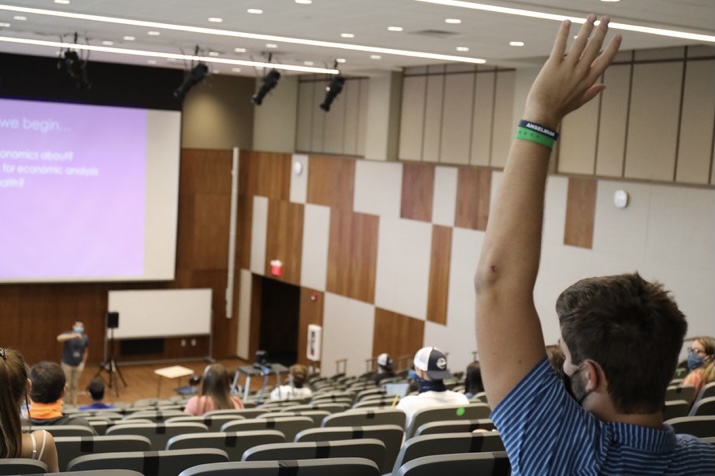We do not need a snow day, even if we really want one
A student raises his hand in a socially-distanced lecture in the new Melucci theater.
March 31, 2021
A successful negotiator must never negotiate against themself, but as so many chuckleheaded celebrities have reminded us, “we are all in this together.” In the debate over how tight is too tight for campus COVID restrictions, it is tempting to assume the role of His Majesty’s Loyal Opposition and criticize any move by Saint Anselm Administration. However, after hitting an all-time-high of fourteen positive cases last Monday, it has become increasingly apparent that we, the students, must make sacrifices. If cases do not fall then, classes will likely become virtual, and we might even be sent back home. No one wants this.
SAC students must weigh the costs and benefits of their actions over the coming days and weeks. One example of this is the hope and request by many students for a mental health (snow) day. Such a day would almost inevitably lead to increased COVID transmissions on campus and would push us a little bit closer to the point of no return. Every room party, trip off campus, or maskless interaction moves us closer to that point as well. These instances are all choices that students make. While the administration has certainly tried to control these student choices, they have not been altogether successful. Past a certain point, administration cannot be responsible for our actions.
The question is then, which actions are justified? Some risks are unavoidable. Students will not stay locked in their rooms unless forced to do so. They will not shun their friends, nor will they completely stop going off campus. To steal from C. S. Lewis, “Whether it ought to happen or not, the thing you are recommending is not going to happen.” That being said, if we want to avoid the consequences of crossing that undefined threshold that will condemn us to Zoom classes and family dinners, we must find some way to determine which risks are explicable and which are not. We need to make smart decisions.
This is not to absolve SAC administration from all its duties to keep campus safe and students on campus. The strategy they have chosen thus far is failing. They imposed a rigid, inflexible system upon students. Some of their restrictions are difficult to enforce, a dining-hall reservation system in the age of screenshots, while others are impossible. Restricting dorm capacity to one guest per person was never realistic and remains unrealistic today.
The same can be said of rules mandating a mask be worn when using the restroom. Many COVID restrictions are out of touch. The problem begins when these uncompromising rules become so suffocating that students begin to ignore all precautions. The child with helicopter parents growing up to be a rebellious teenager is a modern cliché. The same dynamic exists on the Saint Anselm Campus today. Administration stops social events on campus, and so social life moves off campus. When you squeeze a balloon, the air doesn’t disappear; it moves.
Another failure of administration is the phase system. While promising at first, it has become increasingly apparent that the color-coded phases are not flexible enough for the ever-changing landscape of a COVID-riddled campus. Despite cases going up, it took several weeks to reverse phases. The system was designed as a pacification measure, nothing more. We started out in the most restrictive phase at the beginning of the semester when there were no on-campus transmissions. This system is obviously counterintuitive. If the administration is unwilling to use the phase system effectivley, it is worthless.
To stop COVID, we must make sacrifices, but those sacrifices should be led by students. It is our decisions that have the most consequences. It is us who will suffer if courses move online.
This is my request to my fellow Anselmians: be responsible, be smart, and be conscientious. When you make decisions, take a moment to think about the risks. If you believe a situation might lead to the spread of COVID, avoid it. If we all take responsibility for our actions, cases will drop. Our fate is in our own hands.



